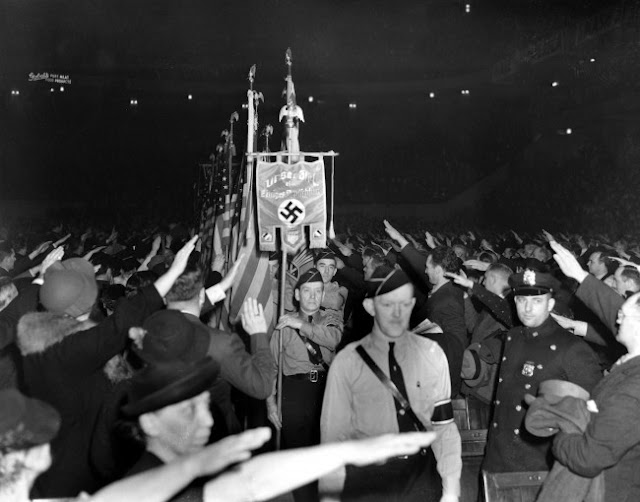Sunday 14 January 1940
 |
| Leopold III, Belgium's monarch from 1934, reviewing Belgian troops in early 1940. |
Mechelen Incident: While Hitler has postponed his invasion, the Allies still anticipate it. On the morning of the 14th, Dutch Supreme Commander Izaak H. Reijnders cancels all pending leaves, closes strategic bridges and plants them with explosives. Belgian King Leopold messages Winston Churchill asking for guarantees should the Germans invade.
The mood does not improve during the day, and General Gamelin orders his troops to advance to the Franco-Belgian border during the night. This causes a diplomatic row between France and Belgium, which had never consented to French troops on its neutral territory. Meanwhile, Belgian Chief of the General Staff Lieutenant-General Édouard van den Bergen, who acted precipitously on the night of the 13th to cancel leave in a dramatic national broadcast, falls into disgrace when the invasion he expects on the 14th fails to occur.
In essence, the Mechelen Incident is turning into one of the most successful, albeit completely unintended, subversive operations to unnerve and split the enemy of the entire war.
Battle of the Atlantic: The British government replies to the concerns of the American governments that have complained about violations of neutrality during the Battle of the River Platte. British Minister to Panama submits a diplomatic note stating that:
"The British "reserve their full belligerent rights in order to fight the menace presented by German action and policy and to defend that conception of law and that way of life, which they believe to be as dear to the peoples and Governments of America as they are to the peoples and Governments of the British Commonwealth of Nations."Royal Navy destroyer HMS Greyhound captures German freighter Phaedra.
US freighter Narbo is released from detention at Gibraltar, but the British seize some of her cargo.
Convoy OG 14 forms at Gibraltar and HX 16 departs from Halifax.
German Military: The plan for the invasion of Norway was Admiral Raeder's idea originally. Hitler delegates proposed Operation Weserubung off to the Kriegsmarine to work up (it is still called Studie Nord). The operation is scaled larger, with an increase from just one division to a full oversized army corps (mountain division, airborne division, motorized rifle brigade & two infantry divisions). The planners also expand the initial targets to suppress resistance and forestall British intervention. Denmark is added as a target to create a land bridge in the direction of Norway. Warships are to be used as troop transports to speed and the element of surprise. The plan becomes more comprehensive but also exposes the force to potential Royal Navy attacks.
Japan: Faced with serious and unexpected reverses in China from the Chinese Winter Offensive, the Abe government resigns. Admiral Mitsumasa Yonai replaces him and forms a new government.
China: The Chinese 5th War Area is still on the attack. It launches probes against Kaocheng, Shihlingszu, Wangchiatai, Sunchiatien, and Chuchiamiao.
Holocaust: Death by starvation and maltreatment in the Jewish Ghetto of Warsaw are estimated to be running at 70 people per day.
American Homefront: The German-American Bund in New York City is raided and eighteen people arrested.
 |
| An event of the German-American Bund at Madison Square Garden. Note the skeptical-looking cop at the lower right. |
January 1940
January 1, 1940: Finns Carve up the SovietsJanuary 2, 1940: Finnish Counterattacks Continue
January 3, 1940: Soviets Trapped
January 4, 1940: Soviet Breakout Attempts Fail
January 5, 1940: Dicing Up the Soviets
January 6, 1940: Soviet 44th Division Runs
January 7, 1940: Shakeup in Soviet High Command
January 8, 1940: Ratte Road Battle Ends
January 9, 1940: British Submarines in Peril
January 10, 1940: Mechelen Incident
January 11, 1940: Finns Surround More Soviets
January 12, 1940: New Soviet Attacks at Taipale
January 13, 1940: Fall Gelb Postponed
January 14, 1940: Japan's Government Falls
January 15, 1940: Soviets Prepare More Carefully
January 16, 1940: German Atrocities Uncovered
January 17, 1940: Bletchley Park in Action
January 18, 1940: New Hope for Allied Shipping
January 19, 1940: Finnish Attacks at Salla
January 20, 1940: Churchill Urges Cooperation
January 21, 1940: Asam Maru Incident
January 22, 1940: Dissension Within British Government
January 23, 1940: Dissension in South Africa
January 24, 1940: NKVD Blocking Detachments
January 25, 1940: Auschwitz Site Selected
January 26, 1940: Millionaire Bunker Destroyed
January 27, 1940: U-20 Sinks Four Ships
January 28, 1940: Softening Up the Finns
January 29, 1940: Moscow Willing to Talk
January 30, 1940: Hitler Throws Down the Gauntlet
January 31, 1940: Timoshenko Is Ready
2019
No comments:
Post a Comment